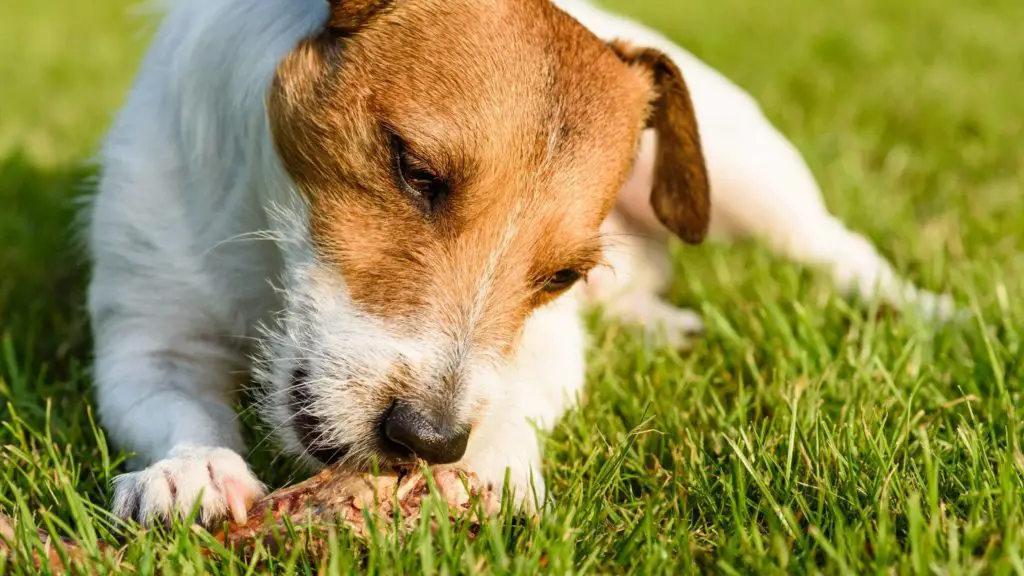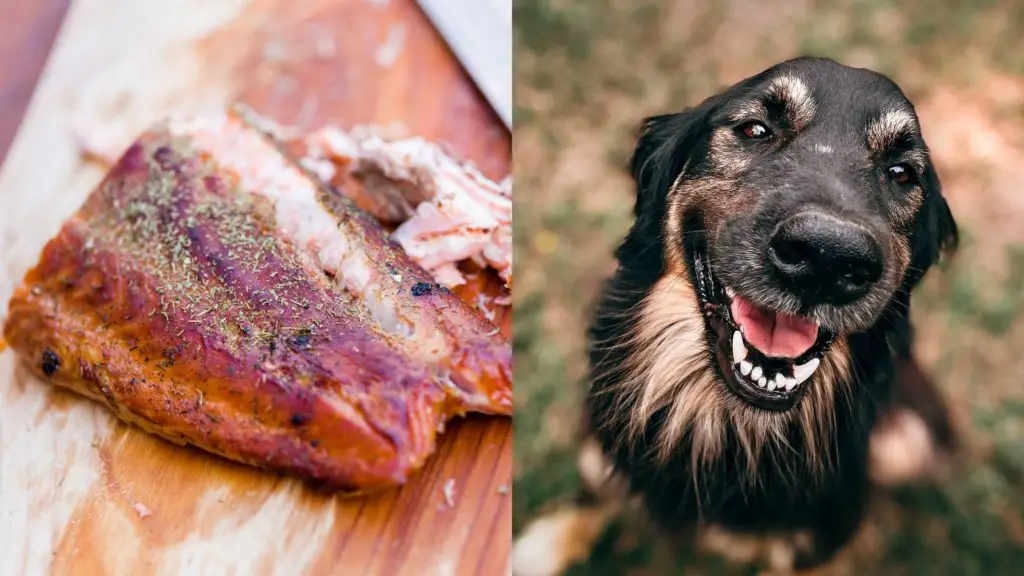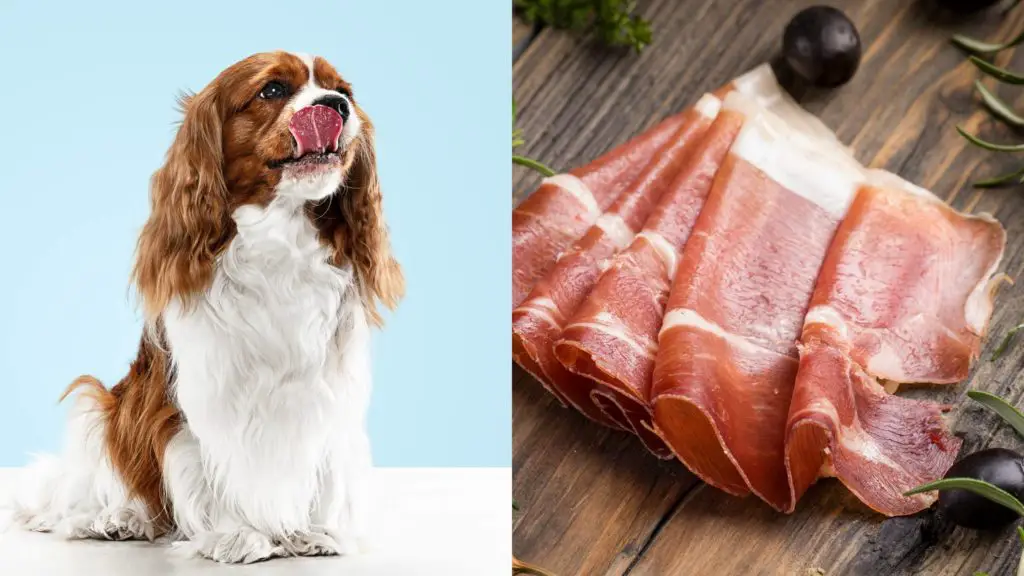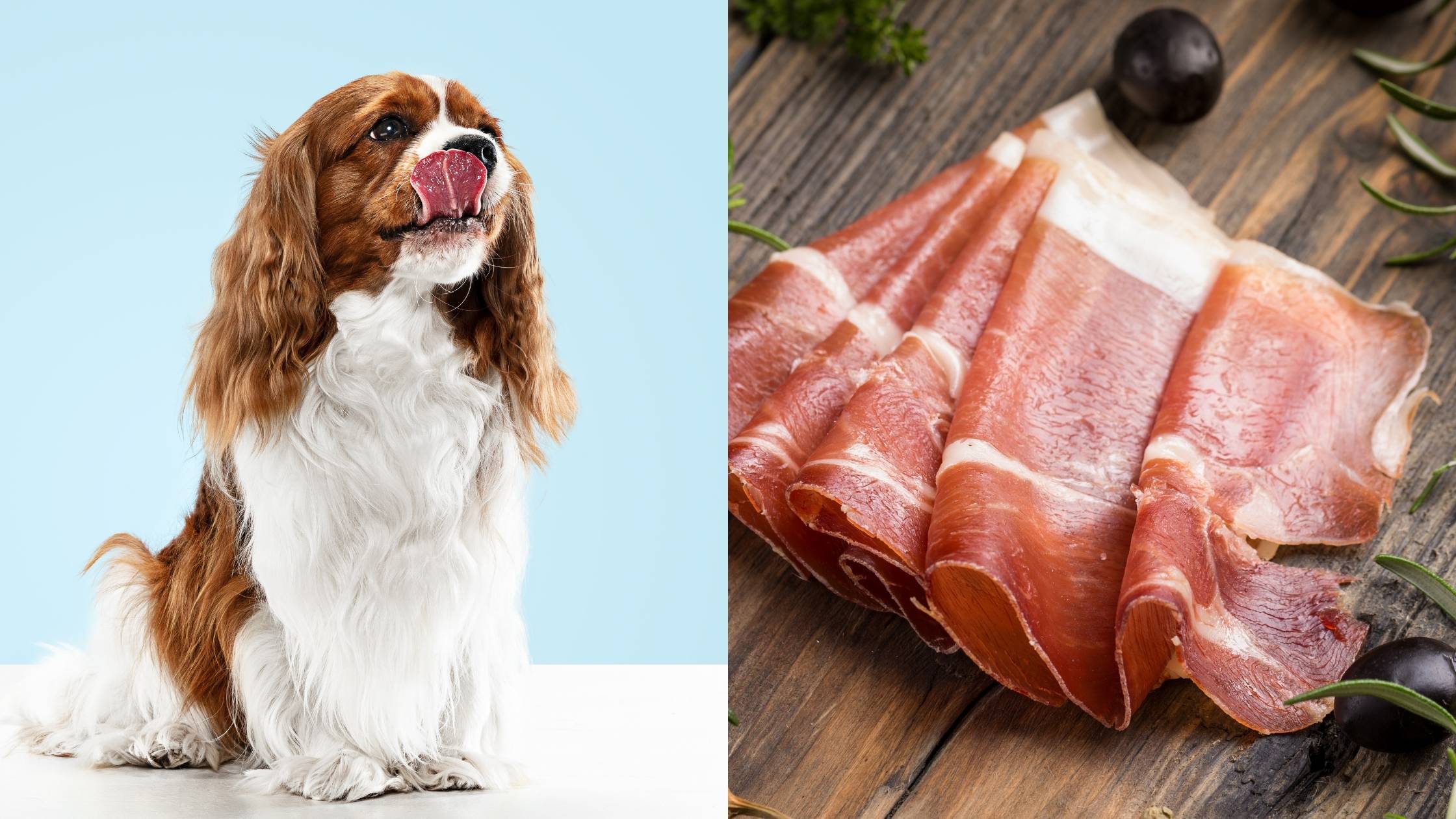Last Updated on 11/17/2021 by Veronica Jones
Prosciutto means ‘ham’ in Italian and is enjoyed as a savory salty snack alongside cheese and crackers all over the world. The meat is made from pork legs, which are then covered in salt and left to cure for a few weeks. The meat is then washed and seasoned before drying at a controlled temperature for up to 36 months.
So next time you’re eating prosciutto or serving up a selection of cured meats for your friends and family, you may be wondering can dogs eat prosciutto too?
Let’s find out.
Can dogs eat prosciutto?
No, dogs should not eat prosciutto, including beef prosciutto because they are highly processed meat that contains lots of salt and fat. The nitrates and spices often found in cured meat can also be very dangerous for dogs to consume.
Prosciutto paste should also be kept out of reach of your dog’s paws for the same reason.

Can dogs eat cured meat?
Cured meats, including salami, pepperoni, bacon, pancetta, chorizo and prosciutto pate contain dangerous levels of salt for dogs.
If our furry friends consume too much salt they may experience salt poisoning which can lead to various health issues including diarrhea, vomiting, tremors, a high temperature, depression and seizures. Large consumption of salt can even cause death in dogs.
Cured meats also usually contain spices such as pepper, garlic and paprika that are toxic to dogs. Garlic contains thiosulfate that deprives red blood cells of oxygen, causing them damage. All of the above are extremely bad for a dogs health and should not be consumed by canines.
Raw prosciutto contains dangerous bacteria that can cause parasitic diseases in humans and animals. Never let your pet come into contact with uncooked meats.

What is salt poisoning?
If a dog consumes too much salt, he will naturally drink more water to quench his thirst and prevent damage from being done to his body. However, if your pooch ingests too much salt over a short period of time, the cells in a dog’s body start to release water to try to balance the excess amount of salt. This process damages brain cells and can cause neurological symptoms such as headaches and seizures.
Symptoms of salt poisoning in dogs
If your small dog shows any of the signs of salt poisoning listed below, you should contact your veterinarian immediately.
• Stomach pains
• Loss of appetite
• Swollen tongue
• Vomiting
• Diarrhea
• Convulsions
• Extreme thirst and urination
• Muscle spasms
• Loss of energy and appetite
• Difficulty breathing
If your furry friend experiences salt poisoning, it is likely that they will need IV fluid therapy and electrolytes to control dehydration. Your vet will gradually adjust the salt levels in your dog’s body to avoid a sudden change in sodium levels, which can cause a heart attack or brain swelling.
Can a dog eat other cured meats like parma ham?
Parma ham is also considered a cured deli meat and should not be given to dogs. It is cured in the same way as prosciutto, by adding lots of salt and being left to dry. Parma ham contains no nutritional benefit to dogs. It can make them very sick due to the high levels of sodium it contains.
Can dogs eat smoked salmon?
For the same reason that dogs shouldn’t eat cured meat, they should not eat smoked salmon either. This is because the salmon is cured in excessive amounts of salt.
As smoked salmon isn’t cooked, there is also a small chance that the salmon contains parasites that can lead to salmon poisoning, a bacterial infection in dogs. Symptoms of salmon poisoning include a lack of appetite, diarrhea, vomiting, weight loss and discharge from the eyes or nose. Increased heart rate, respiratory rates and muscle tremors are other common signs.
If the infection is not treated quickly it can significantly reduce a dog’s chance of survival.

What happens if a dog eats ham?
Like other processed meats, feeding your dog ham could lead to a life-threatening disease called pancreatitis. In particular, store-bought ham contains extremely high levels of sodium.
If your dog ate a small amount of ham, they will become thirsty. Fresh water should be provided for your dog’s body to try and balance the levels of salt. Too much salt in your dog’s diet and dog food can make them very poorly and experience sickness, diarrhea and lethargy. Sodium can also cause more serious health issues such as kidney damage, comas and even death.
Ham bones should not be given to your pooch because splinters from the bone can cause a dog to choke or damage their mouth, throat or even intestines. Ham bones have also been known to create blockages in a dog’s intestines so should be kept out of reach of your dog.
Suitable cured meat substitutes to feed your pooch
There is a huge range of healthy, natural cured meat substitutes for dog owners to consider, available from vets and pet stores that your furry friend can enjoy safely. As with all treats, they should be given in moderation as part of a balanced diet.
• Prosciutto sticks that contain 100% natural ingredients are a great alternative to cured meats and contain nutritional benefits.
• Cooked lean meat such as boiled chicken breast that hasn’t been cooked in oil or any seasonings is a suitable snack for canines. Make sure you cut the chicken into very small pieces to prevent choking.
• You can also find meat-free natural, healthy treats for your pooch in your kitchen cupboards. Apples, bananas, carrots, cooked sweet potatoes, broccoli and cooked squash make great dog-safe nutritional meat-free treats.
When introducing new foods to pets, be aware of food allergies and symptoms in dogs.
Dogs and prosciutto
Dogs need protein, but there are much better sources to feed your dog than cured or processed meats.
If your dog eats prosciutto, pet owners must make sure there is access to plenty of water. If your dog consumes a large amount of any cured meat, you should contact your vet immediately and let them know that you’re concerned about your dog being at risk of salt poisoning.

Looking for More Great Articles About What Your Dog Can (or Can’t) Eat?
- Can Dogs Eat Fish Sticks? EVERYTHING You Need to Know!
- Can Dogs Eat Lunch Meat (Deli Meat)? Is it Harmful?
- Can Dogs Eat Pizza Rolls? Everything You Need to Know
- Can Dogs Eat Meatballs? Are They Healthy?
Reference list
- AKC “can dogs eat ham” https://www.akc.org/expert-advice/nutrition/can-dogs-eat-ham/#:~:text=1.,is as a protein source. Accessed 10th October 2021
- Pet poison helpline “salt poisoning in dogs” https://www.petpoisonhelpline.com/poison/salt/ Accessed 10th October 2021
- AKC “pancreatitis in dogs” https://www.akc.org/expert-advice/health/pancreatitis-in-dogs/ Accessed 10th October 2021
- Purina “human foods dogs can eat” https://www.purina.com/articles/dog/nutrition/holiday-human-foods-dogs-can-and-cant-eat Accessed 10th October 2021

